Doctor Who stars on why series leads the way on trans representation: ‘I don’t feel tokenised’
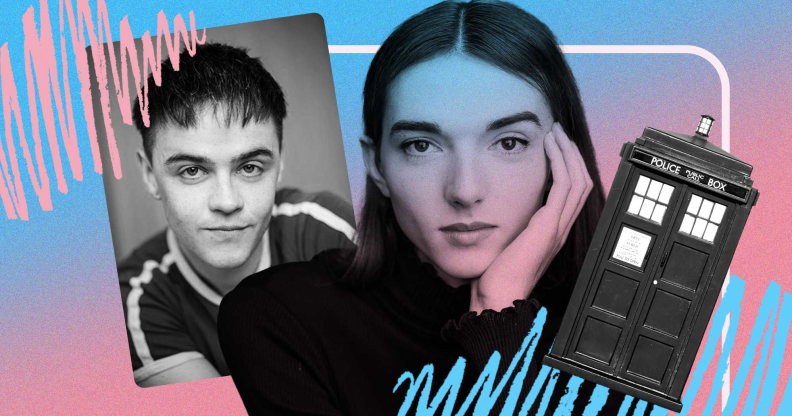
Doctor Who stars Mary Malone and Pete MacHale talk exclusively with PinkNews about trans representation in the series. (Supplied/BBC/PinkNews)
Since Doctor Who first aired on 23 November 1963, the beloved BBC series has become a refuge for queer and transgender sci-fi fans.
60 years on, soon-to-be-seen Doctor Who stars Pete MacHale and Mary Malone say the iconic show is “showing the world that trans people are here”.
When the Tardis re-materialises with Ncuti Gatwa at the helm as the 15th Doctor in his upcoming Christmas special, “The Church on Ruby Road”, the loud and proud contingent of trans Whovians will see something special represented on screen: themselves.
For a long time now, Doctor Who has been, intentionally or not, very queer. Its subversive approach to storytelling introduced viewers to the gender-fluid Time Lord and a host of aliens lifeforms that refuse to conform to human-constructed social conventions.
The recent 60th anniversary specials saw the show given an expansive queer makeover as showrunner Russell T Davies returning to the beloved sci-fi series.
We’ve already seen Heartstopper‘s Yasmin Finney and Uncoupled actor Neil Patrick Harris wow audiences during their guest appearances, which included a memorable performance of Spice Girls’ “Spice Up Your Life” from Harris and poignant moments of trans joy from Finney.
Meanwhile Gatwa’s first full season, airing in 2024, promises cameos from drag superstar Jinkx Monsoon and out actor Jonathan Groff.
Doctor Who has cast trans actors Pete MacHale and Mary Malone in upcoming episodes
For Mary Malone and Pete MacHale, two trans actors set to enter the Doctor Who universe in upcoming episodes, the hope is that other TV shows will take note of what the series is doing and in turn improve – or simply include – depictions of trans people.
“Russell’s always been someone who gives a voice to the queer community on TV so it’s really exciting,” Malone tells PinkNews. “He’s done really well to make a lot of space for us, so I’m grateful for that, and I’m hopeful that that’s something more people can do.”
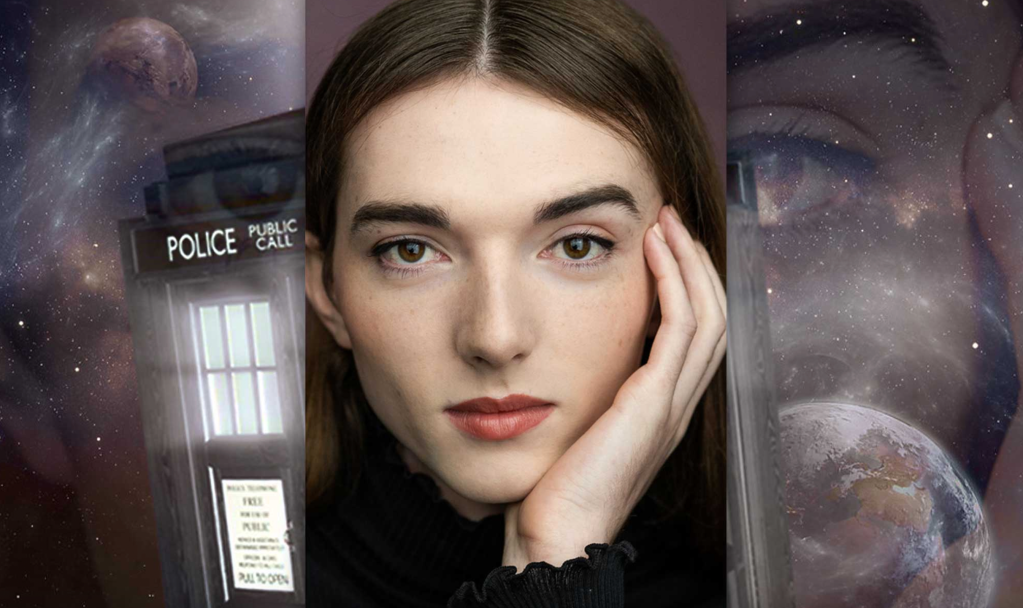
Malone, who starred in Abigail Thorn’s stage debut The Prince and featured in an episode of ITV crime drama Vera earlier this year, is set to appear in Doctor Who‘s Christmas Day special.
The episode has already created a nationwide ruckus after pre-releasing “The Goblin Song”, a villainous musical number that has been steadily climbing the UK charts.
But outside the hit-making soundtrack, little is known about the episode and Malone is determined to avoid spoilers by leaving the details of her role a surprise for fans.
“Doctor Who was definitely a part of my childhood,” she says, explaining that Dalek toys and Doctor Who magazines were scattered around her home while growing up.
It was the hype for the 60th anniversary specials – starring the returning David Tennant and Catherine Tate – and beyond that drew her back to the show.
“We’re seeing so much queer and trans representation,” Malone says. “It has always been there, but I’m seeing that more and more now, so I’m excited to start watching them. Yaz’s [Finney] casting is amazing, she is a superstar. I’m really happy to see trans women killing it in Doctor Who.”
It’s a slightly different story for Pete MacHale, who will make Doctor Who history as the first out trans man to star in the show when he appears in the 2024 season.
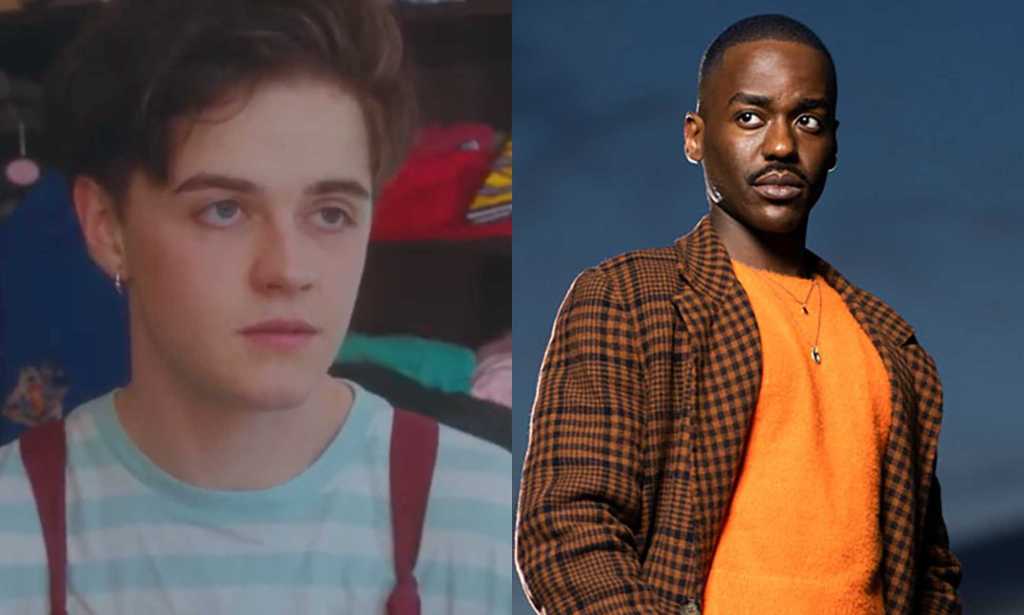
A life-long Doctor Who fan, he has a “soft spot” for Tennant’s original era and rewatches the episodes – which he believes contain “some of the best writing on TV” – “quite a lot”.
MacHale, who previously starred alongside Finney in 2022 short film Mars, also says that the “unabashedly queer” spin-off series Torchwood proved formative. The heart of the drama focused around the tragic love story between Captain Jack Harkness (John Barrowman) and Ianto Jones (Gareth David-Lloyd).
“I came out for the first time to my family about being trans when I was about 13,” MacHale recalls. “Watching something that was so unabashedly queer made me feel really comfortable with that.
“I weirdly found a lot of comfort in Torchwood, which is quite grim and horrible at times.”
Doctor Who has a history of queer-coded characters
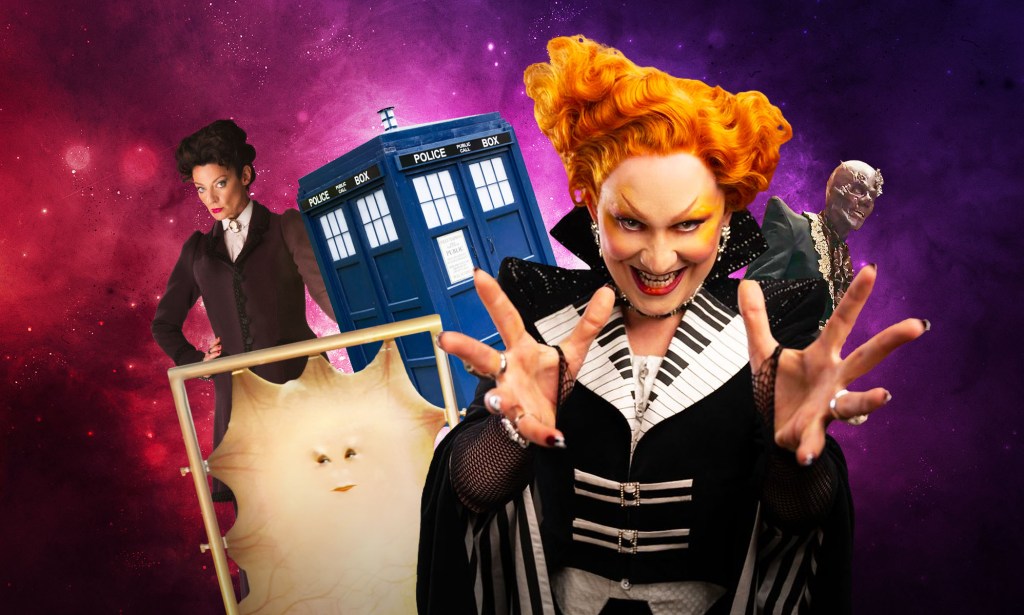
MacHale also points to the Doctor Who character Lady Cassandra, played by My Family star Zoë Wanamaker.
Many believe the character – a human in the form of a piece of skin who appeared in two episodes, “The End of the World” in season one and the following season’s “New World” – was trans-coded because in the second story, Cassandra’s mind enters male clone, Chip, where she finally makes peace with her past self.
“I don’t think that they are written as trans explicitly, but you have this person in a male body with somebody else’s mind looking at the person who they know they were at one point, holding them in reverence,” MacHale says.
“It is a really beautiful coming together moment.”
Meanwhile, Malone notes: “The queerness was always there, even if it was not always speaking about queerness. There was just like a campness.
“Even if there weren’t queer relationships or trans people, it was still written with a queer gaze.”
Doctor Who‘s Pete MacHale and Mary Malone have faced online hate for being trans
While Pete MacHale and Mary Malone are excited for trans visibility to be “front and centre” in Doctor Who’s newest iteration, they both voice reservations after enduring negative social media comments when their casting was announced.
“For Russell, this is a very loud statement of queerness which feels nice, but there’s a difficulty with visibility for trans people – especially for trans feminine people – in that it always comes with danger,” MacHale says.
“Now, more people are aware that we exist and, unfortunately, some of [them] have an issue with us. By bringing trans talent front and centre, there’s a level of fear and worry about it.
“But at the same time, I think the way Russell is going about it feels like a really bold statement of support. It’s like: ‘I am putting these people front and centre because I think they’re f**king great’.”
“Whatever job I ever get, I always face a certain amount of hate for it, always,” Malone reveals. “But there’s something about Russell’s personal support, and the whole of Doctor Who, really that they’ve cast us and that we’re in this.
“You can feel there’s so much love and support even though, sadly, there is a lot of hate still.”
More to be done to make the TV industry a more trans-inclusive place
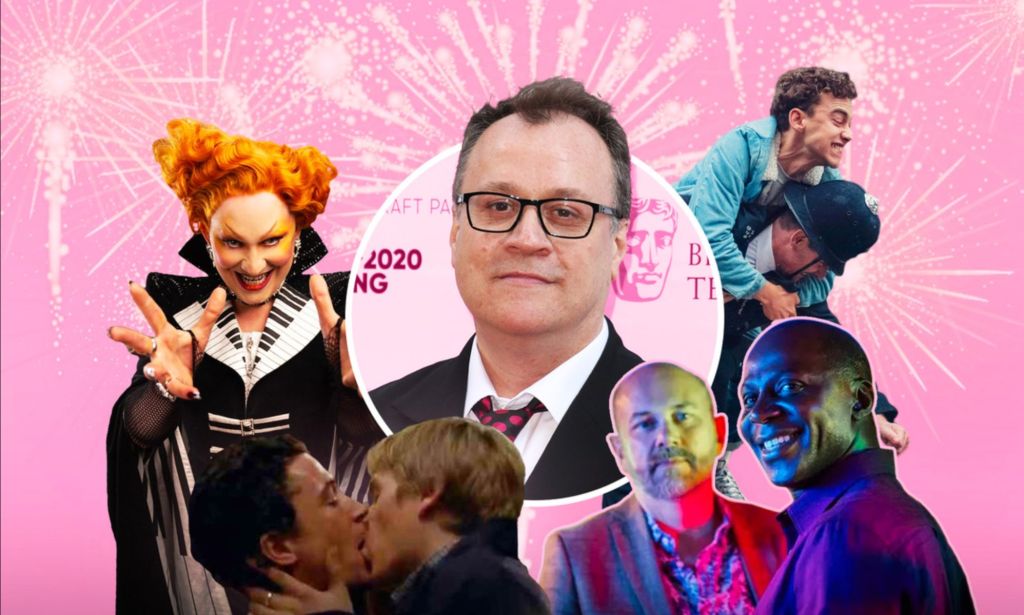
Both Malone and MacHale enjoyed their time on the Doctor Who set. However, they are more than ready for transgender people to have their time to shine behind the camera, too.
“Who is telling the story? Who is behind the camera? How safe can someone feel on set if they’re being stared at by 50 to 60 cis people,” MacHale asks.
“I want to know that the person who is guiding how I’m seen on screen is someone who understands a little bit of what it means to be a trans person.”
Outside her work on Doctor Who, Malone says she feels “tokenised and objectified” as an actor. Trans people are still “represented in such a contained narrative” that falls short of recognising them or representing them as “anything other than our trans identity”, she says.
“I feel that the representation in Doctor Who is showing the industry that we can do more than just ‘be the trans girl’. It shows the world that we are here, and it asks people to see us, really see us as people. I don’t feel tokenised within Doctor Who.”
As for what they hope trans fans can take away from their respective Doctor Who appearances, Malone reflects: “[The festive period] can be really tough for queer and trans people.
“I really hope that queer and trans people in complicated family situations at Christmas can all turn on the TV and, hopefully, see themselves and feel affirmed and celebrated.”
MacHale adds that given Doctor Who’s boundless possibilities, viewers can find themselves in the most unexpected places.
“If you see yourself in myself, or Mary, or the characters we represent, great, beautiful, I’m happy about that. But don’t limit yourself to that”, he says. “Transness has never been about specificity. It’s been about opening up the possibility of who you are.
“One of the magical things about Doctor Who is that it’s about the whole universe. If you see yourself in the little pink alien, f**king great, just look for what makes you happy.”
Ncuti Gatwa stars in his debut Doctor Who adventure, “The Church on Ruby Road”, on 25 December at 5:55pm on BBC One and BBC iPlayer. It will stream globally on Disney+.

